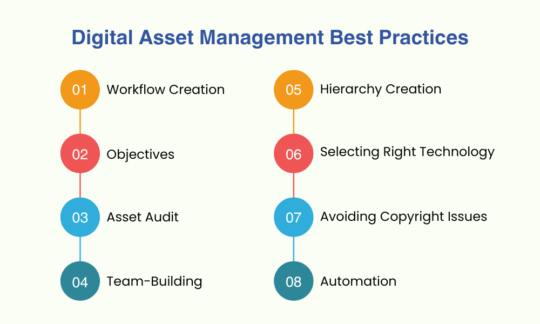The standard procedure of business has evolved a lot in recent years.
Nowadays, it’s not the traditional books or receipts that are brought into use for proof, verifications, or storing information.
These traditional methods of business documentation have now been ushered into the digital era.
Digital assets simply mean the digital copy of day-to-day files or any business document.
These digital assets include files like videos, photos, documents, and other media.
However, these digital assets need to be maintained efficiently to speed up daily operations.
Digital asset management involves the creation of a system where such important digital files could easily be stored, shared as well as organized.
Let us discuss some of the questions related to digital asset management.
According to the finding of research and markets, the market value of digital asset management was valued at USD 2,962.2 million in 2020 and is expected to grow up to USD 8,158.6 million by 2026.
Some of the key reasons behind this can be the increase in the number of people adapting to a digital lifestyle, growing use of the internet, growing need for digital advertisement, etc.
According to the reports of Statista, the spending on digital advertising in the year 2020 was USD 356 billion, and the digital advertising revenue is expected to grow up to USD 460 billion by 2024.
In the US market search advertising is considered to be the most profitable as well as promising a platform for digital advertisements.
Considering all of these promising and increasing figures it won’t be wrong to say that digital asset management needs to be thoroughly implemented at the organizational level as in the nearby future majority of businesses is going to be dependent on it for not only better revenues but also for easy daily management.
Some of the key practices that need to be followed for efficient digital asset management are as under:
Keep a workflow of your current strategy in place.
This workflow will make you understand where the process can be optimized and where the new strategy needs to be implemented.
Moreover, a ready workflow will provide you with information related to the storage, usage rights, file formats, etc.
This will also prove helpful whenever users are investing in DAM tools.
Also Read: Marketers Guide for Digital Asset Management (DAM)
This needs to be the first question that has to be asked before going for DAM (Digital asset management).
You need to define as well as determine your goals before opting for any DAM process or tool.
Adopting a DAM strategy or tool without any clear objective is less likely to succeed.
You should be having complete and transparent information about the asset you have.
Auditing your assets will assist you and provide information about the importance of the assets in your daily business process.
Moreover, it would assist in making you understand the objective of assets useful for your business.
The audit will also indicate to users the importance of assets as to which ones are to be managed.
A team will assist users in taking the credibility of the tasks that are needed to be done in accordance with the DAM.
Such a team will consist of a team leader, system administrators, digital asset librarian.
Consistent patterns like proper naming, tagging, storage will always assist in effective DAM strategies.
Users should adopt practices like placing the assets in the folders created specifically according to their workings.
Also, this hierarchy creation will assist in easy searching and managing of assets.
For implementing DAM successfully an appropriate technology will assist in effective success.
Users need to keep the below-mentioned points while looking for the right technology:
-
- Integration: The tool should be able to integrate with the DAM system and also with the existing structure.
- Safe: Select the tool that has security features to avoid any security loopholes.
- Easy to use: Ultimately it is your staff that has to operate the DAM tool. Platforms with extended features often confuse staff. An easy-to-use tool is always recommended.
DAM administrators should take into consideration the copyright issues and should prevent them anyway.
For this administrators should keep restricted access.
Access to use assets should only be given to the verified staff members only.
If the content is being purchased on the license the DAM systems have to be configured such that it notifies the admin on the expiration of the license.
Automating the majority of tasks can be done in DAM.
Tasks like file format conversion, automating tagging, etc. can be automated to save a majority of the time.
Some of the key benefits of DAM are as under:
When easy accessibility is provided, coordination just gets better. By bridging the gap between the team’s contents can be easily made accessible.
Easy accessibility minimizes the duplicity and thus increases productivity.
Compared to a simple search system in traditional storage, users can perform advanced searches with better filters.
This also saves a lot of time that usually gets invested in searching only.
Even if the slightest change has been done by anyone, admins will know about it.
A DAM gives read-only and edit access to members and also provides security such as two-step authentication.
DAM not only saves the asset or asset history but also its versions that might have been created in past.
Such versions of the assets can be easily recovered at any time.
An efficient DAM system will provide assistance in various integrations like photo editing, video editing, format conversion, or connecting to other cloud storage services.
Conclusion
DAM practices are needed in modern businesses to improve the control of digital resources. However, before opting for digital asset management, one should always evaluate their strategy and should create a workflow to have a better understanding.
Also Read:
Customer Centric Marketing Strategies
Top Digital Asset Management Tools and their Benefits to Businesses





